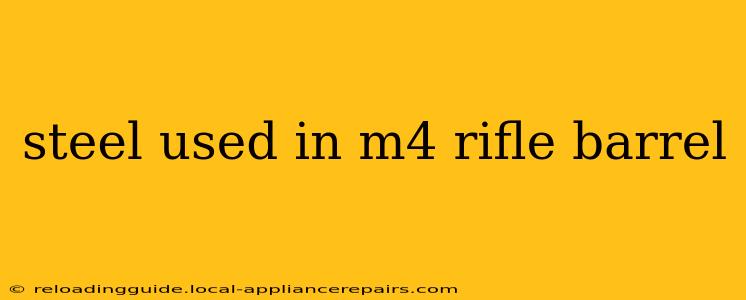The M4 carbine, a cornerstone of modern military and law enforcement arsenals, relies on a high-performance barrel to deliver accuracy and reliability under demanding conditions. The choice of steel for this critical component is far from arbitrary; it's a carefully considered decision based on a complex interplay of factors impacting strength, durability, heat resistance, and ultimately, the weapon's effectiveness. This article delves into the specific types of steel used in M4 rifle barrels, exploring their metallurgical properties and how they contribute to the weapon's overall performance.
The Crucial Role of Barrel Steel
The M4 barrel's steel must withstand extreme stresses. Repeated firing generates intense heat and pressure, demanding a material with exceptional:
- Tensile Strength: The ability to resist stretching or tearing under load.
- Yield Strength: The point at which the steel begins to deform permanently.
- Fatigue Resistance: The ability to withstand repeated stress cycles without fracturing.
- Creep Resistance: The ability to resist deformation under sustained high temperatures.
- Heat Resistance: Crucial for maintaining accuracy and preventing barrel warping during rapid firing.
Common Steel Grades in M4 Barrels
While the exact specifications can vary slightly between manufacturers and even specific production runs, M4 barrels are typically constructed from chrome-molybdenum steel alloys. These alloys offer a superior combination of strength, toughness, and heat resistance compared to simpler carbon steels. Here are some common grades:
4150 Chrome-Molybdenum Steel
This is a widely used steel grade for M4 barrels, prized for its excellent combination of strength, toughness, and wear resistance. The addition of chromium enhances corrosion resistance, crucial for a weapon that may be exposed to various environmental conditions. Molybdenum contributes to improved hardenability and creep resistance, critical for maintaining accuracy under prolonged firing.
4140 Chrome-Molybdenum Steel
Similar to 4150, 4140 is another common choice, offering a slightly lower cost while still providing excellent mechanical properties. The difference lies primarily in the carbon content; 4140 has a slightly lower carbon percentage, resulting in slightly lower strength but potentially better toughness and machinability. This can lead to cost savings in manufacturing without significantly compromising performance.
Cold Hammer Forged vs. Button Rifled Barrels
The manufacturing process also plays a significant role in barrel performance. Many high-quality M4 barrels are cold hammer forged, a process that produces a denser, more uniform barrel with superior strength and accuracy. Button rifling, a more cost-effective method, is also used. Regardless of the rifling process, the underlying steel grade remains crucial to the overall quality and performance of the barrel.
Beyond the Steel: Factors Affecting Barrel Performance
While the steel grade is paramount, other factors contribute significantly to an M4 barrel's lifespan and accuracy:
- Heat Treatment: The precise heat treatment process significantly impacts the steel's final properties, optimizing its hardness, strength, and durability.
- Barrel Profile: The shape and dimensions of the barrel influence its weight, heat dissipation, and overall performance.
- Chrome Lining: Many M4 barrels feature a chrome-plated bore, further enhancing corrosion resistance and extending barrel life.
Conclusion
The steel used in M4 rifle barrels is a critical factor in the weapon's reliability and accuracy. High-strength chrome-molybdenum alloys, such as 4150 and 4140, provide the necessary combination of strength, toughness, and heat resistance to withstand the rigors of intense use. Understanding the material science behind barrel construction allows for a deeper appreciation of the engineering that goes into producing this vital component of a modern firearm. Further research into specific manufacturers' specifications will reveal more nuanced details about the precise steel grades they employ.

